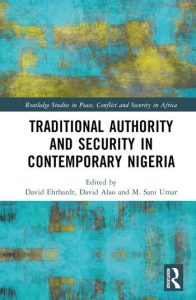Traditional Leaders and Dispute Resolution Research with the University of Leiden
This research with a timeline of 2018 to 2024 aims to document and explain the conflict resolution capabilities of traditional rulers in Nigeria. Discounted in early postcolonial times as anachronistic, ‘decentralised despots’, traditional rulers all over Africa have recently made a surprising comeback as influential and often respected public authorities. One of their main areas of re-discovered leadership is conflict resolution: from resolving marital spats and settling land disputes to gathering intelligence against insurgents and (de)mobilising combatants. However, while many African societies have witnessed a revival of traditional power, there remains considerable variation in the conflict resolution capabilities and legitimacy of different traditional rulers in different places. Explanations for both the revival and its varied impact abound, but they often compete, and given the literature’s heavy reliance on single case studies we lack the evidence to systematically compare and evaluate them. This project makes use of the unique diversity of traditional rulers within Nigeria and the variation in their roles in conflict resolution to begin building systematic comparative evidence on the puzzle of the traditional revival. It aims to collect both quantitative (survey) and qualitative (oral histories, archives) data on traditional authorities in four of the country’s cultural zones: the north-west, the middle belt, the south-west and the south-east. Using this data, the research will (i) systematically describe the capabilities of traditional rulers, particular in conflict resolution, and (ii) develop theory to explain the historical paths that different traditional authorities have taken to reinvent and revive their conflict resolution capabilities.
Research Outputs:
P1. One literature review article on the causes of the traditional revival
P2. One article describing the configurations and functions of different traditional (and other) authorities in the selected cities.
P3. One article presenting the findings on the variation in roles of traditional authorities in conflict resolution in Nigeria;
P4. One article presenting the findings on explaining the process of resurgence of traditional rulers in conflict resolution.
P5. Book proposal for a monograph on traditional authority and conflict resolution in Nigeria (to be submitted to Cambridge University Press).

